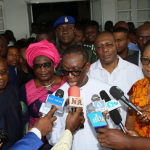
Penultimate week, a letter written by the Vice-Chancellor (VC) of Ajayi Crowther University, Oyo, Oyo State, Professor Dapo Asaju went viral. In the strongly-worded message to parents and guardians of the institution, the VC expressed his disaffection over what he described as overindulgence of the students by their parents and warned about raising the “next generation with the same corrupt and indisciplined ethos that has ruined Nigeria.”
While I have nothing against some of the rules set by some private varsities in the country, I am concerned that some of these rules and restrictions actually negate what a university stands for. Prior to the letter that instigated this write up, I have had interactions with some lecturers in private universities who regret ever abandoning the public varsity system for private varsities.
One of them told me that after attending several interview sessions and asking all the relevant questions needed for him to make a switch, nothing prepared him for what he later witnessed on ground. “One week into my employment, it appeared I had walked into a convent and not a university or a learning environment. There were rules for everything, from what you teach, to your academic relationship with your students; you are monitored,” he told me.
He also pointed out that the students were mostly between 14 and16 years old, and that it is only in extreme cases that you have students of 17 years and above. Another insight he gave – which I was already familiar with – was that these students mainly attended private secondary schools either as boarders or chauffeur driven to and from school. Many cannot even navigate their streets as they have never walked 500m radius away from home. “We have hyper-protective parents who want to practically ensure their children are under protective custody at all times.”
Since no public varsity can guarantee such protection, the best bet are private varsities which provide “safe haven” for these students with the attendant repercussions of them being totally cut off from the same society they would eventually be a part of after graduation. The first shock the lecturer said he got was when parents started calling to find out if their children have eaten! This, he told me, is not limited to lectures alone but extends to the VC, Registrar and other principal management staff.
Another lecturer told me researchers or visitors cannot freely drive into his university campus except they are invited by a guest. What shocked him to his “bone marrow,” he told me, was the fact that he has to officially write letters to parents of students whenever they are going for field trips which are prerequisites for certain courses. “You are not only to write to the parents, you must wait for their acknowledgement before embarking on such trips. In some extreme cases, a parent may decline.” He pointed out.
According to him, on one of such occasions, some parents wrote to know the level of security the university has put in place toward the safety of their children and whether bodyguards are part of officials for the trip. The bottom line is that parental consent is needed for any trip outside the campus, even for a basic trip like visiting media houses which mass communications students are compelled to undertake from time to time. From all indication, we are gradually breeding a platoon of irresponsible citizens and an apartheid system that will blow in our face in the future.
The university system has an enviable history that dates back to the medieval period. A fundamental characteristic of a university is academic freedom. The first documentary evidence of this comes from early in the life of the University of Bologna, which adopted an academic charter, the Constitutio Habita between 1158 and 1155 which guaranteed the right of a traveling scholar to unfettered passage in the interests of education. In essence, a university is free to engage in a clash of ideas and to interrogate any issue of societal concern. This broadmindedness means that academics and students should not be constrained in the pursuit of knowledge.
To this end, the university is not a Nigerian creation, but we have brought our own uniqueness to the system despite the fact that there are universal rules – that is why the “uni” exists in universities! Universities are meant to be great and global learning citadels, with universal rules guiding the academic curriculum, with a great emphasis on intellectual freedom for both faculties and students.
So, where do we situate some of these glorified dorms and convents claiming to be private-owned and religious varsities in Nigeria? Some are abnormalities. Of course, they are having their way now, because the Nigerian elite are masters of deception adept at fleeing from their problems. Rather than taking a holistic look at why public varsities are “faltering” the answer is opening the flood gates to all manner of private varsities and urging those who can afford their huge fees to go patronise them! This is the height of failure in effective policy formulation strategy.
Embedded in the VC’s letter are some of the contradictions of these abnormalities. That letter itself can be seen as a subtle protest by some parents. A varsity is a place where a student should be allowed to grow and make decisions that would shape his life after leaving the ivory tower.
Most of those in my generation that attended public varsities knew there were cult groups – and they are still there – on campuses, but because we had a clear picture of where we were going we looked the other way and refrained from joining such groups. This is what varsities are; they give individuals the chance to grow their natural souls, driven by free choices. The secret of knowing why we should not cross such lines starts from the home where our value systems are effectively shaped.
Why are most families struggling and suffering? They are because parents are absent and their absence impacts the critical development of their children. Fathers are as much critical to their daughters as well as their mothers. Fathers provide half the genetic material for personality development. Studies show that fathers are the primary and most valuable support persons for the mother during pregnancy and childbirth. Also a healthy relationship between children and their fathers are important for good development.
Children from homes with absentee parents are more likely to run away from home or live on the street. Studies have also shown that achievement level, sense of mastery, and marital happiness of girls correlate with the presence of an involved father. Security regarding females and their fathers is a key element since it greatly shapes their development
Dearth of statistics aside, I am convinced that millions of Nigerian fathers struggle as adult parents because they lacked a model of effective fathering in their own lives. Men who experienced this form of parental neglect from their own families of origin oftentimes become emotionally and physically absent to their own families formed through marriage.
There is thus the importance of preparing such fathers for fathering by first helping them overcome detached relationships they had with their own fathers. One would argue that the key to becoming a father isn’t merely commitment to wife, children and family, but about prior and primal step of manhood in becoming a son.
A Demographic study on father’s absence and divorce – which I came across recently – indicate that children – especially boys – growing up without fathers usually have problems in the areas of sex-role and gender-identity development, school performance, physical adjustment, and in the control of anger and aggression. Equally too, the age at which a daughter loses her father is meaningful since it influences her perception of male, the world as well as her academic advancement – all because of missing the key element of a father.
It is unfortunate that universities which should be at the forefront in proffering solutions to some of the pressing social crises that we are facing as a nations have gone to sleep. Kidnappings, corruption, unprovoked killings, terrorism, intolerance and a whole range of issues we are grappling with today are all social crises which universities are better placed to research upon and proffer workable solutions.
You may be interested

Arsenal Equal Chelsea’s London Derby Feat After 5-1 Win Vs Palace
Webby - December 21, 2024Arsenal equaled Chelsea’s London derby achievement following their 5-1 win against Crystal Palace in Saturday’s Premier League game at Selhurst…

Haaland Backs Guardiola To Turn Man City’s Poor Form Around
Webby - December 21, 2024Erling Haaland had said he and his Manchester City teammates are still backing manager Pep Guardiola to turn the team’s…

PSG To Reignite Interest In Osimhen
Webby - December 21, 2024Paris Saint-Germain have contacted Napoli to discuss signing Victor Osimhen in January, according to reports in France.It is reported that…

















![American Pastor, David Wilson Seen Eating The Box Of Woman Who Isn’t His Wife [Video]](https://onlinenigeria.com/wp-content/uploads/2019/10/american-pastor-david-wilson-seen-eating-the-box-of-woman-who-isnt-his-wife-video-150x150.jpg)






![T.B Joshua Reacts To Rape Allegation Against Him By Bisola Johnson With Evidence [Video]](https://onlinenigeria.com/wp-content/uploads/2019/07/t-b-joshua-reacts-to-rape-allegation-against-him-by-bisola-johnson-with-evidence-video-150x150.png)


